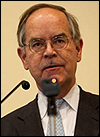Readers of a certain age will remember the late Sen. William Proxmire (D-Wisc.) and the infamous Golden Fleece Award that he issued regularly from 1975 to 1988. The advertised purpose of the award was to identify what he considered to be wasteful government spending.
Basic scientific projects were among his favorite targets. Unfortunately, the senator appeared to pick his targets by the ease with which they could be held up to public ridicule. He never seemed to grasp the important role that serendipity plays in scientific discovery, or the fact that it is often the quirkiest experiments that lead to the most valuable new insights. 
On April 26 a group of Congressmen headed by Tennessee Rep. Jim Cooper announced the establishment of a new award, which they are calling the Golden Goose Award, that is the very antithesis of the old Golden Fleece Award.
According to a fact sheet that the coalition sponsoring the award prepared, it “will highlight the often unexpected or serendipitous nature of basic scientific research by honoring federally funded researchers whose work may once have been viewed as unusual, odd or obscure but which has produced important discoveries that have benefited society in significant ways.”
Joining Cooper in supporting the award are Rep. Jason Altmire (D-Penn.), Rep. Charlie Dent (R-Penn.), Rep. Robert Dold (R-Ill.), Rep. Rush Holt (D-N.J.) and Rep. Paul Tonko (D-N.Y.). The organizations creating the award include: American Association for the Advancement of Science, Association of American Universities, Association of Public and Land-grant Universities, Breakthrough Institute, Progressive Policy Institute, The Science Coalition and the Task Force on American Innovation.

“This is something that Rep. Cooper has been wanting to do for a number of years,” said Christina West, Vanderbilt’s Assistant Vice Chancellor for Federal Relations and a member of the organizing group. “I’m thrilled that this coalition of associations and organizations has emerged to bring his idea to fruition and am pleased that Vanderbilt is able to play a role. In a time of shrinking federal budgets, it’s more important than other ever to remind the public of the importance of sustained federal investments in science and engineering research.”
The founders named the award after the old Aesop fable “Killing the Goose That Laid the Golden Eggs.” In most tellings, a farmer and his wife discover they have a goose that lays a golden egg every day. They suppose that the goose must have a great lump of gold inside and, in order to get all the gold at once, they kill the goose . . . only to find that its insides are no different from an ordinary goose.
The award’s sponsors view America’s federally funded research enterprise “as an extremely valuable goose whose golden eggs are the innovations and discoveries born from basic research that transform lives and fuel the economy” and they oppose those who want to put federally funded R&D on the fiscal chopping block.

The first awards will be announced in September and then annually thereafter. A selection committee made up of distinguished scientists and experts on science will pick the winners. Vanderbilt Vice Provost for Research Dennis Hall has agreed to serve as one of the members.
“The Golden Goose awards provide another opportunity to spread the word about how important research in science and engineering are to the United States’ way of life. I want to help spread that message,” said Hall, who is also a professor of electrical engineering.
Nominations will come from the founding organizations and from the national societies of the various scientific disciplines. However, the organizers will also consider over-the-transom nominations. A nomination form will be available by email request to info@goldengooseaward.org.
The organizers say that they intend to give awards to a broad range of scientific disciplines, including the social sciences, which were one of Sen. Proxmire’s favorite targets. The announcement was covered by the Chronicle of Higher Education, Inside Higher Education and the Science Insider.
–David Salisbury